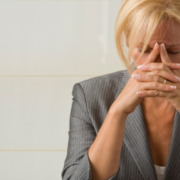Executive Presence: Climbing the career ladder with body image concerns weighing you down
 Everyone has a body image concern of one kind or another, but for women working in professional fields, body image can add a new dimension of stress to a career already fraught with obstacles for women. Concerns about weight and body type, height, skin, hair, breasts, teeth, and even voluntary body choices, like tattoos and piercings, can impact both a woman’s own confidence at work, and how her professionalism and competence are viewed by others.
Everyone has a body image concern of one kind or another, but for women working in professional fields, body image can add a new dimension of stress to a career already fraught with obstacles for women. Concerns about weight and body type, height, skin, hair, breasts, teeth, and even voluntary body choices, like tattoos and piercings, can impact both a woman’s own confidence at work, and how her professionalism and competence are viewed by others.
While business leaders in every industry value “executive presence,” the term is only loosely defined. Is executive presence for women an extension of expected perfection? Is it actually code for only one standard of beauty – being a well- dressed, skinny, white woman with perfectly coiffed hair? How can we ensure that as women leaders we aren’t judging other people on the wrong criteria?
Fat: the last taboo of discrimination?
Being overweight is perhaps the most common and, arguably, the most discriminated-against body image concern. According to the Centers for Disease Control and Prevention, more than one-third (34.9% or 78.6 million) of U.S. adults are obese, and even more people fall into the overweight-but-not-obese range. But despite the large percentage of Americans who struggle with their weight, the subject remains taboo for women in professional fields, perhaps because the number of overweight women – but not men – decreases with higher income and education.
Olivia, 36, an environmental attorney in the Washington D.C. area, struggles with obesity and says “there are so many negative perceptions attached to overweight people. I do feel it’s impacted my career because I have to overcome a lot of the prejudices about fat people to prove myself.”
While she has tried losing weight, Olivia says she goes out of her way to make sure her clothes are tailored to fit exceptionally well. She buys expensive clothing to look as professional as possible, which she admits is a challenge when shopping for plus-size selections. Olivia feels that thinner women in her industry are able to “get away with” wearing more trendy clothing and jewelry, but she tries to keep her look classic, though even that can be more difficult since some classic pieces, like button-up collared shirts, often do not come in plus-sizes.
Olivia observes, “people feel totally okay insulting overweight people to their face, when doing so over any other issue would be taboo.”
In other cases, employers who have seemed generally accepting may begin to show discrimination when women facing different body image issues want to advance past a certain level in their field or to take on new opportunities. “I do think that if you are trying to make partner, what you look like matters more because they want people they can put out in front of clients,” says Olivia.
“I’m pretty confident,” says Karry, 33, an accountant from New York City, who also worries about the way people perceive her because she is overweight. “Most people here in New York City are thin. Sometimes I feel a little out of place, or like maybe people are looking at me differently.” She has joined a gym and always makes an effort to wear make-up, but says ultimately women should just embrace who they are and how they look. “Worrying about how other people look at you will only be exhausting and take away your happiness.”
Looks-based discrimination in the workplace
Shayla, 30, is an African-American attorney from Texas who says her biggest body image concern is her natural hair. “I don’t straighten my hair using chemical relaxers and I have a lot of hair,” she says. “My look has led to a nickname – I’m the lawyer with ‘the hair.'” Shayla says her hair has been the source of a many cruel jokes and side-eyed comments, including being asked why she does not comb her hair or whether she is “trying to bring Africa back.”
Shayla also gets many positive comments about her appearance, but those can also make her uncomfortable. “I don’t want to be known for a physical attribute. I’m not comfortable with that being what defines me as a lawyer, she says. “I’ve worked very hard and prepare diligently for each case. It really makes me mad when the only comment I get after a case is ‘you look gorgeous today.’ It’s almost a slap in the face,” she says. “I would like to be known as an excellent orator or an attorney who drafts exceptional briefs. While being known as ‘the hair’ or ‘gorgeous’ help me stand out, I don’t want it to define my career because hair changes and beauty fades.”
Marie, 37, a St. Louis attorney who is currently seeking employment, believes her body image may have impacted whether she was hired for some jobs she interviewed for. “I believe there may have been times when I was passed over for a more physically attractive female candidate who did not have as many qualifications,” she says.
While many women believe they have been discriminated against because of their appearance, some believe the negative effect on their own confidence is the largest concern. Isabel, 35, is a healthcare researcher from New England who says her self-confidence issues have spilled over into areas not related to her weight. “I tend to question my ability and competence to complete assessments reliably, even though I know that I am well-trained, even better trained than most of my colleagues,” she says.
Sexism and stereotypes
Women who are battling body image concerns may feel especially discouraged if they are already facing a sexism problem their field. Olivia says sexism in the legal industry is rampant, but it is hard for her to pinpoint whether some of the discrimination she has faced has been because she is overweight or because she is a woman, since she has struggled with her weight from the beginning of her career. Women already have to work harder to prove themselves, Olivia says, and women facing body image concerns have to work 10 times harder than that, but it is possible to succeed despite those obstacles.
Stereotypes about body image and appearance also contribute to incorrect assumptions about females in certain fields. “There are stereotypes of all types of lawyers,” says Shayla.”If you are overweight, wear less fashionable clothing – people automatically think you are a government employee. I’m from a very affluent area and name-brands and flash get the most cash. It’s a little hard to keep up.”
Marie agrees that some jobs may stress the importance of looks over others. “When I practiced law in the private sector, I felt there was a greater implied emphasis on looking the part with higher-end clothing and accessories,” she says. “While working as a government attorney, I felt the body image concerns were lower.”
Carry yourself with confidence
Opinions are split about whether body acceptance and confidence can overcome body image concerns, and, of course, are influenced by each woman’s own experiences. Shayla says, “the way a woman carries herself will hide a multitude of so-called flaws.”
Ultimately, says Marie, the best thing women who have body image concerns can do is to put their best self forward, and then move on. “If I look presentable, neat, and put together, then I am ready for work each day,” she says. “Love your current self and body, always have a smile, and treat others kindly. Your inner-beauty and self-confidence is a significant part of your image and how others perceive you. Draw attention to your positive character and job skills, rather than focusing on negative body image. And never speak negatively with co-workers about your own body image or that of others.”
By Leilani Genovese











